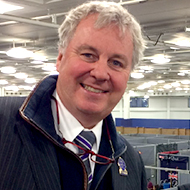
The RVC's Professor Roger Smith takes over the role.
Professor Roger Smith, professor of Equine Orthopaedics at the Royal Veterinary College (RVC), has been elected junior vice president of the British Equine Veterinary Association (BEVA).
Elected to BEVA Council three times, once in 1997, once in 2000 and once in 2019, Professor Smith has played an active role in academia, on boards and in councils. He was awarded the Fellowship of the RCVS in 2016, and was elected to president of the European College in July 2017.
Having graduated from the University in Cambridge in 1987, Professor Smith has been at the RVC since 1990 as a resident in Equine Studies. He is a diplomate of the European Colleges of Veterinary Surgeons and Veterinary Sports Medicine and Rehabilitation, and is also a Large Animal Associate of the European College of Veterinary Diagnostic Imaging.
Alongside his election to BEVA Council, Professor Smith has also been named one of BEVA's '60 faces', an anniversary initiative to celebrate 60 people in the equine veterinary community who have made significant contributions to the industry.
Commenting on his achievements, Professor Roger Smith said: “To be included alongside the other 59 ‘faces’ is a great honour, and I am proud to be featured together with some of industry’s trailblazer and future leaders.
“I have supported and admired the great work of BEVA for over three decades and am looking forward to continue working with the Council and contributing to their efforts within the equine veterinary community.”
Currently splitting his time between running a specialist orthopaedic referral service within the RVC, and directing research into equine tendon disease, Professor Smith's principal research interests are understanding the pathogenesis of tendon disease, diagnostics for tendon and ligament disease and stem cell therapy for tendons in both horses and humans.
Image (C) Royal Veterinary College



 The Veterinary Medicines Directorate (VMD) is inviting applications from veterinary students to attend a one-week extramural studies (EMS) placement in July 2026.
The Veterinary Medicines Directorate (VMD) is inviting applications from veterinary students to attend a one-week extramural studies (EMS) placement in July 2026.